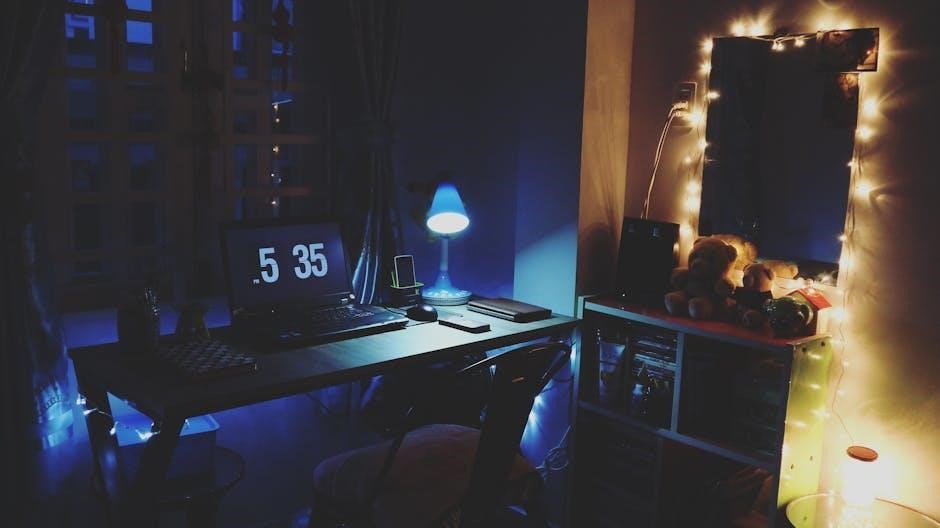
Night study involves learning during late hours, often before exams, to maximize retention and focus. It requires disciplined strategies like the Pomodoro Technique and organized note-taking to enhance productivity and comprehension effectively.
Why Night Study is Necessary
Night study is essential for maximizing retention and focus, especially during exam preparation. It allows learners to review material in a calm environment, reducing procrastination and enhancing understanding. Consistent late-night study sessions can improve time management and ensure thorough preparation, helping students meet deadlines and achieve better academic outcomes. It also fosters discipline and prioritization, critical for long-term success.
Benefits of Organized Night Study
Organized night study reduces procrastination, allowing learners to cover material methodically. It helps meet deadlines, ensures thorough preparation, and minimizes exam anxiety. A structured schedule enhances focus, prioritization, and time management, leading to better academic performance. By creating a calm, distraction-free environment, night study fosters discipline, helping students retain information effectively and achieve their goals with greater clarity and confidence.

Setting Up the Study Environment
A well-lit, quiet, and clutter-free space is essential for night study. Ensure comfortable seating, minimal distractions, and necessary resources within reach to maintain focus and efficiency.
Importance of Lighting and Seating
Proper lighting and seating are crucial for night study. Use table lamps or overhead lights to reduce eye strain. Choose an ergonomic chair and desk to maintain posture, preventing physical discomfort. Ensure the setup minimizes distractions, promoting focus. Position chairs away from beds to avoid drowsiness. A well-lit, comfortable environment enhances concentration and productivity, making late-night study sessions more effective and sustainable over time.
Minimizing Digital and Ambient Noise
Minimizing noise during night study is essential for maintaining focus. Use noise-canceling headphones or play ambient sound to block distractions. Turn off digital notifications and choose a quiet space away from traffic or household activity. Silence creates an environment conducive to concentration, helping you absorb information more effectively and retain it for longer periods without mental fatigue.

Creating a Study Schedule
Set clear goals and organize tasks to maximize productivity. Allocate specific time blocks for each subject, using techniques like Pomodoro to maintain focus and structure your study sessions effectively.
Breaking Down Study Sessions
Divide your night into focused intervals, such as 25-minute Pomodoro sessions with 5-minute breaks. After four cycles, take a longer break to refresh your mind. Prioritize challenging topics early when your focus is sharpest, ensuring a balanced distribution of subjects throughout the night for optimal retention and reduced mental fatigue.
Allocating Time for Different Subjects
Assign specific time blocks to each subject based on difficulty and importance. Schedule challenging topics during peak focus hours, ensuring balanced coverage. Alternate between subjects to maintain engagement and prevent burnout; Allocate longer durations to complex areas and shorter ones to revision or lighter topics, maximizing efficiency and retention throughout the night study session.

Effective Study Techniques
Effective study techniques enhance learning by optimizing focus and retention. Methods like active recall, the Pomodoro Technique, and structured note-taking improve understanding and reduce study time significantly.
Pomodoro Method for Night Study
The Pomodoro Method involves studying for 25 minutes, followed by a 5-minute break, repeating this cycle four times before taking a longer break. This technique enhances focus and productivity during late-night sessions by creating a structured rhythm, helping maintain concentration and reduce eye strain from screens or books. It’s particularly effective for managing time and staying motivated during night study.
Active Recall and Note-Taking Strategies
Active recall involves testing yourself on material without notes, enhancing memory retention. Note-taking strategies include summarizing key points in your own words, using headings, and highlighting essential information. Organized notes help review concepts efficiently, while self-assessment techniques like flashcards or practice questions reinforce understanding, making late-night study sessions more productive and effective for long-term retention.

Managing Time and Priorities
Managing time and priorities during night study involves setting clear goals, allocating specific time blocks for each task, and minimizing distractions to maximize productivity and focus effectively.
Identifying Most Critical Topics
Identify the most critical topics by reviewing exam syllabi or past papers. Focus on high-priority areas first, using lists or charts to organize tasks. Allocate more time to complex subjects and ensure alignment with study goals. Break down topics into manageable sections, prioritizing understanding over quantity. This structured approach ensures efficient use of limited study time during night sessions.
Avoiding Time-Wasting Activities
Avoid distractions by setting clear study goals and sticking to your schedule. Minimize multitasking and limit phone use. Use apps to block social media and focus on one task at a time. Prioritize tasks to ensure time is spent on what matters most. Regular breaks help maintain focus and prevent procrastination, keeping you on track during late-night study sessions.

Staying Focused and Avoiding Distractions
Minimize multitasking, silence notifications, and create a distraction-free environment. Use focus-enhancing tools and apps to block social media. Set clear goals to maintain concentration and productivity during night study sessions.
Strategies to Maintain Concentration
Use the Pomodoro Technique to break study sessions into manageable intervals. Prioritize tasks, eliminate digital distractions, and practice active note-taking. Maintain a structured study schedule, set specific goals, and review progress regularly. Incorporate mindfulness exercises to stay focused and avoid mental fatigue. Limit multitasking and create a dedicated workspace to enhance concentration and maximize productivity during night study sessions.
Limiting Use of Electronic Devices
Minimize distractions by turning off notifications and logging out of social media. Use apps like Freedom or SelfControl to block non-essential websites. Set specific times for checking emails or messages. By reducing screen time and digital interruptions, you can maintain focus and concentrate on your study material more effectively during late-night sessions.

Taking Breaks and Avoiding Burnout
Taking regular breaks prevents mental fatigue. Short intervals refresh the mind, enhancing focus and productivity. Schedule time to relax and recharge to avoid burnout effectively.
Importance of Short Breaks
Short breaks are essential for maintaining focus and preventing mental fatigue during night study. They allow the brain to rest and recharge, improving retention and reducing eye strain. Incorporating brief intervals helps sustain productivity, prevents burnout, and keeps the mind fresh for extended study sessions, ensuring overall effectiveness and well-being.
Signs of Mental and Physical Fatigue
Mental fatigue during night study can manifest as difficulty concentrating, forgetfulness, or slowed thinking. Physical signs include blurred vision, headaches, and muscle tension. Emotional indicators such as irritability or hopelessness may also arise. Recognizing these signals is crucial to prevent burnout and maintain productivity during late-night study sessions.

Nutrition and Health Tips
Proper nutrition fuels late-night study sessions. Opt for nutrient-rich snacks, hydrate with water, and eat balanced meals to maintain energy and focus without caffeine reliance.
Snacks and Drinks for Late-Night Study
Healthy snacks and hydrating drinks are essential for late-night study sessions. Opt for nutrient-rich options like fruits, nuts, and protein bars to maintain energy levels. Avoid sugary or caffeinated beverages that cause energy crashes. Water and herbal teas are excellent choices to stay hydrated without disrupting focus. Balance snacks with portion control to ensure sustained productivity throughout the night.
Maintaining Energy Levels Without Caffeine
Stay hydrated with water, herbal teas, or coconut water to refresh your mind. Incorporate light, nutrient-dense snacks like fruits, nuts, and whole-grain crackers. Short walks, stretching, or deep breathing exercises can boost energy naturally. Avoid heavy meals and opt for small portions to prevent lethargy. Prioritize a balanced diet and maintain a calm study environment to sustain focus and vitality throughout the night.

Reviewing and Reflecting on Material
Summarize key points to reinforce understanding and retention. Engage in self-assessment to identify gaps in knowledge. Use active recall and reflection to deepen comprehension and prepare for exams effectively.
Summarizing Key Points
Summarizing key points helps consolidate information and enhance retention. Focus on identifying main ideas, using bullet points for clarity, and reviewing notes to ensure understanding. Regular self-testing and reflection reinforce learning, while concise summaries make complex topics manageable. Avoid distractions during this process to maintain focus and ensure effective comprehension of the material being studied.
Self-Assessment Techniques
Self-assessment involves evaluating your understanding and progress. Use flashcards, quizzes, and practice tests to identify strengths and weaknesses. Reflect on your performance, track improvements, and adjust your study plan accordingly. Regular self-testing helps build confidence, ensures retention, and highlights areas needing more focus, enabling you to refine your strategy and achieve better results in your night study sessions.
Night study, when approached with discipline and strategy, can significantly enhance learning and retention. Stay persistent, prioritize your well-being, and remember that consistent effort leads to success.
Final Tips for Successful Night Study
Stay consistent with your study schedule and maintain a positive mindset. Set clear, achievable goals for each session. Use techniques like the Pomodoro Method to stay focused. Limit digital distractions and take short breaks to recharge. Keep your study space organized and prioritize your well-being. Embrace challenges as opportunities to grow and celebrate small progress. Success comes from persistence and self-care.
Encouragement and Motivation
Remember, night study is a challenging yet manageable task. Stay positive and remind yourself of your goals. Celebrate small victories, like completing a difficult chapter or mastering a concept. Each effort brings you closer to success. Believe in your ability to learn and grow. Keep pushing forward, even when it feels tough—your hard work will pay off in the end.